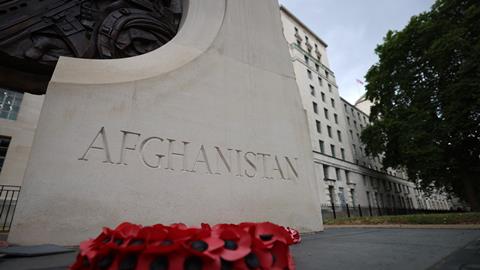On 15 July, the High Court lifted a super-injunction that had concealed the scale - or even the existence - of a major data breach involving 19,000 Afghan nationals who worked with the UK government.
For two years, parliament, the media, the public, and Afghans themselves, were kept in the dark.
But the breach was far more serious than previously known.
On July 17, a second injunction was lifted, revealing that the leaked database also included the names and contact details of more than 100 British officials - among them special forces operatives (SAS and SBS), MI6 officers and senior military personnel.
This goes some way to explaining why the Ministry of Defence was granted extraordinary secrecy to, as then defence secretary Ben Wallace put it, 'protect those people who could have been or were exposed' to Taliban reprisals.
But serious questions remain about executive power, democratic oversight and the governance culture that allowed secrecy to persist for so long.
As the judge on the case, Mr. Justice Chamberlain, noted, the orders created a 'scrutiny vacuum'.
For almost two years, decisions of profound humanitarian, financial and reputational consequence were made without oversight.
What finally shifted the balance? An independent review commissioned by current defence secretary John Healey, and led by Paul Rimmer, a former deputy chief of defence intelligence. He concluded that the Taliban likely already possessed more detailed data - and that inclusion in the UK dataset alone was unlikely to materially increase risk.
This assessment undermined the rationale for secrecy and ultimately led to the super-injunction being lifted.
This case illustrates how easily democratic safeguards can be bypassed, and perhaps a lack of trust in the media's capacity to report responsibly on sensitive issues. More fundamentally, it reveals how secrecy can become self-perpetuating and self-defeating.
An injunction initially aimed at protecting lives ended up concealing a catastrophic error. It may even have compounded the harm. As Rimmer warned, the government had 'inadvertently added more value to the dataset' through the very secrecy meant to protect it.
There are now urgent questions to answer about how secrecy operates when the state itself seeks protection.
Maybe it's time for another Committee on Super-Injunctions - a new Neuberger Inquiry that focuses not on footballers' privacy, as in 2011, but on national security cases, ensuring democratic oversight and public accountability match the extraordinary power being exercised? To ask whether super-injunctions should be subject to strict statutory time limits, mandated judicial review and confidential parliamentary scrutiny - for example by the Intelligence and Security Committee or the Justice Committee - rather than left solely to judicial discretion?
In fact, maybe we should question whether super-injunctions should be used at all, when the cornerstone of democratic legal systems is the principle of open justice - that justice must not only be done, but be seen to be done? The contrast with other democracies is stark. Try seeking a super-injunction in the United States and you’re likely to be met with a reminder of the Pentagon Papers, President Nixon, and the First Amendment - before being told, simply, no.
Governments do need secrecy but as Sir Richard Dearlove, former head of MI6, once said, 'not as much as you think'. Healey recently put it more bluntly: 'you cannot have democracy with super-injunctions in place'.
No one disputes the need to protect lives. When security and transparency collide, the balance is never easy. The dilemma facing Wallace and his officials was real. Lives were potentially at stake. The full extent of the Taliban's intelligence capabilities were unknown.
But in a democracy, the default must be openness - especially in an age of declining trust in public institutions.
Let this ruling be a turning point. A moment to codify how secrecy operates when the state, not the citizen, is the one seeking protection. A moment for parliament to ensure the tools designed to protect us are never used to conceal from us. And to affirm that democracy must function even, and especially, in the dark.
Kevin Keith is chair of the UK Open Government Network
































1 Reader's comment